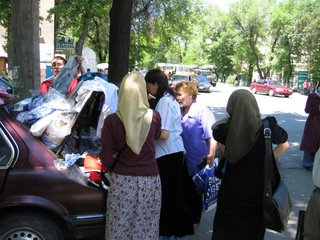
May 17, 2006
This afternoon my friend Zhenya called me. Busy, I promised to call her back, then stupidly forget. In the evening she called again.
Today was the seventh day after her business partner’s death. Usually locals mark the 7-day and the 40-day anniversary.
“I prepared a table of remembrance at the shop today and wanted to ask you to come by. But now I’m already going home,” she said, in a disappointed voice.
I apologized profusely for forgetting to return her call. “Well, maybe you can come to the 40-day pominka,” she said. “It will take place around my birthday.”
I’m putting it on my calendar now.
Yesterday I was listening to the area’s most popular radio station, EuropaPlus. The female DJ introduced a caller as someone who didn’t believe in love.
The young man, Almaz, went on to explain in a dejected voice how he’d loved a girl. Then she was stolen (kidnapped) and married her kidnapper. Now he doesn’t believe love is possible.
The DJ didn’t break her chipper voice for even a moment. Nor did she recognize that love is certainly made more difficult in a place where people have the right to kidnap others and pressure them into marriage against their will. She told him that life would go on and everything would be OK, and then, on to the next caller.
Following Rysbek’s murder, about 5,000 people in Cholpon-Ata gathered for his funeral. I heard that 2,000 of them were mafia.
“Yes,” a colleague who was in Cholpon-Ata that day confirmed when I asked. “The mafia came from all over, even Almaty and other countries.”
After that, hundreds of people in Balykchi (my very least favorite town on my bike ride) blocked the Bishkek to Issyk-Kul road, demanding that the prime minister resign.
When I met a young student in dreadlocks from the Russian city of Kazan, who’d barely made it through the crowds, she told me it was mostly young men.
“They looked rural and kind of crazy,” she said. But on a quest to tour “uncivilized countries” Kyrgyzstan met her expectations. “In Russia we have stability now, so this place seems kind of crazy in comparison.”
My colleague, Alisher, who traveled through the same area said he saw mostly women and elderly.
“I suppose they were probably paid by someone rather than protesting out of principle,” I said.
“They had killed two cows and had some alcohol,” he said. “They seemed to be having a good time.”
On Sunday I took a trip to the Ala-Archa mountains, together with a group of about 50 students of a language school. Ala-Archa is the closest and most accessible park to Bishkek. And because of that, it really attracts the crowds. People streamed in nonstop from morning to afternoon – locals, tour groups, and everything in between. I suppose for that reason, the excursion group I usually travel to the mountains with avoids that park and this was my first time there.
The setting was gorgeous – tall snow-capped mountain peaks, towering juniper trees, silver-white water rushing through the valley. While we baked under the sun, we watched students of Arabic, Chinese, English and Russian present well-prepared skits, games and jokes. Tourists from America, China and elsewhere came off the paved path to watch, attracted by the bright, colorful costumes.
Following several days of sun and extremely high temperatures, today we had a welcome cool and rainy day. A day that actually felt like early summer. A day that allowed one to notice the greenery and the activity.
The markets are now filling with strawberries and cherries from Osh. For me, the giant red mounds are a paradise. Currently at 60 cents to one dollar a pound, the prices will only fall from here.
I’ve been noticing an interesting trend – of people parking their cars somewhere in the city center, and selling things out of the trunk. I’ve seen t-shirts and today and I saw tea. And both times, they attract a large crowd.
Until more competition enters the area, it’s quite a good idea. They are mobile and can reach many markets in a short period of time. And they have no expenses for rent or taxes, which probably allows them to sell their goods cheaper.
And the last piece of interesting local news is that Bishkek is fighting a little malaria problem. Thirty-six people have been diagnosed, mainly migrants who live in the novostroika, newly built communities on the outskirts of Bishkek, largely located on former farmland (which tends to get swampy in rain).
I just got over a few-day virus myself. I’m getting ready for a seminar in Germany and then, a much anticipated visit from my mother. In all this time, it will be only my second visitor in Kyrgyzstan and I have to pass along the positive impression the country has made on me.



No comments:
Post a Comment